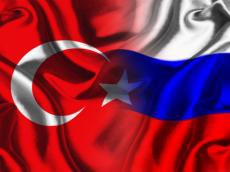|
|
TODAY.AZ / World news
Reverse effect of ‘backstab’
26 December 2016 [12:39] - TODAY.AZ

By Azernews
By Gunay Camal
The recent assassination of the Russian Ambassador to Ankara surely affected Russian-Turkish relations, but not for the worst.
The brutal killing of Karlov, recorded as the tragedy in the country's diplomatic history, could not inflict a political damage on the Turkey-Russia relations, but boost the shattered confidence between the states.
As the murder took place against a background of a recovering Russia and Turkey relations, the perpetrators surely expected cold winds to blow between the two nations once again. But, to surprise of the perpetrators, Karlov’s murder failed to derail the process of normalization of the ties between Russia-Turkey. In addition, Karlov’s death is unlikely to derail the plans of regional players regarding Syria.
During his big press conference on December 23, Russian President Vladimir Putin described the murder of the country’s ambassador in Ankara as an assault on Russia and its ties with Turkey.
“This was primarily an assault on Russia and Russian-Turkish relations. Frankly, I used to be skeptical about claims that our jet was shot down [in Syria in November 2015] without an order from Turkey’s top leadership but rather by people who wanted to damage Russian-Turkish ties," Putin said at the annual press conference.
"But the attack on the ambassador by a special operations officer got me thinking: I feel now it is possible that destructive elements could have found their way into social structures, including the law enforcement and the army," he admitted. "Will this undermine the Russian-Turkish relationship? No, it won’t because we realize the importance of Russian-Turkish ties and will make every effort to deepen them," Putin vowed.
The tragedy occurred just one week after the end of the operation on liberation of Aleppo, which became possible thanks to a deal between Russia and Turkey. President Vladimir Putin, called the killing a “provocation” aimed at sabotaging a rapprochement between Moscow and Ankara and attempts to resolve the conflict in Syria, while some in Ankara named it as “backstab to Turkey”.
Fatih Öke, the former press attaché of Turkey’s embassy in Washington, DC, earlier tweeted: “The bullet to Ambassador Karlov does not only aim him. It aims also Turkish Russian relations”. This statement indicated that there are a number of third parties interested in alienating Ankara and Moscow.
The motivation behind the killing remains unknown yet, but it was unable to change the course of events in Turkey, Russia or talks over resolution of the Syrian issue. The assassination of the Russian ambassador angered both sides but it allowed two nations unite in an anti-terror alliance.
Turkey and Russia have understood that they feel confident with each other on strategic issues, Turkish Foreign Minister Mevlut Cavusoglu said on December 25, adding that both sides kept their words in the implementation of the Aleppo deal that provided a partial ceasefire and evacuation from the city.
“Russia has kept its word in our efforts to implement a ceasefire, to provide humanitarian aid, to save these people [from Aleppo] and to expand the ceasefire to the whole of Syria. They kept their words until the end. It even urged those who violated [the deal]. Likewise, Turkey has also kept its words,” he said.
Turkey and Russia have understood that they can trust each other, the minister said, reiterating that the killing of Karlov was planned and executed by the Fethullahist Terrorist Organization (FETÖ) and described the assassination as “treachery”.
URL: http://www.today.az/news/regions/157236.html
 Print version
Print version
Connect with us. Get latest news and updates.
See Also
- 17 February 2026 [14:55]
Poland backs joining nuclear project amid growing security concerns - 17 February 2026 [12:49]
Trump to 'indirectly' take part in Iran talks - 17 February 2026 [11:02]
ASCO’s “Balak?n” ferry returns to service after major overhaul, sets sail for Kazakhstan - 17 February 2026 [09:00]
Pentagon plans mobile nuclear reactor test - 17 February 2026 [08:00]
Astronomers find planetary system thought to be impossible - 16 February 2026 [21:23]
UK may ban social networks for under-16s in 2026 - 16 February 2026 [20:21]
Astronomers observe new planet-forming system - 16 February 2026 [18:40]
Rubio says Iran nuclear deal ‘not easy’ as US steps up pressure - 16 February 2026 [12:42]
Suspicious envelope found at Israeli PM Netanyahu's office - 16 February 2026 [12:19]
Foot-and-Mouth disease spreads fast - South Africa takes emergency action
Most Popular
 All dots above the "I" and how Baku knows how to place them
All dots above the "I" and how Baku knows how to place them
 President Ilham Aliyev, President of Serbia make press statements
President Ilham Aliyev, President of Serbia make press statements
 Three killed in post-election clashes in Bangladesh as BNP secures parliamentary majority
Three killed in post-election clashes in Bangladesh as BNP secures parliamentary majority
 Belgrade hosts 1st meeting of Strategic Partnership Council between Azerbaijan and Serbia
Belgrade hosts 1st meeting of Strategic Partnership Council between Azerbaijan and Serbia
 Russia may face fresh sanctions after Navalny poisoning findings
Russia may face fresh sanctions after Navalny poisoning findings
 Ukraine, ASEAN discuss advancing mutually beneficial cooperation, deepening dialogue
Ukraine, ASEAN discuss advancing mutually beneficial cooperation, deepening dialogue
 Why Serbia matters to Azerbaijan in fractured Europe?
Why Serbia matters to Azerbaijan in fractured Europe?
